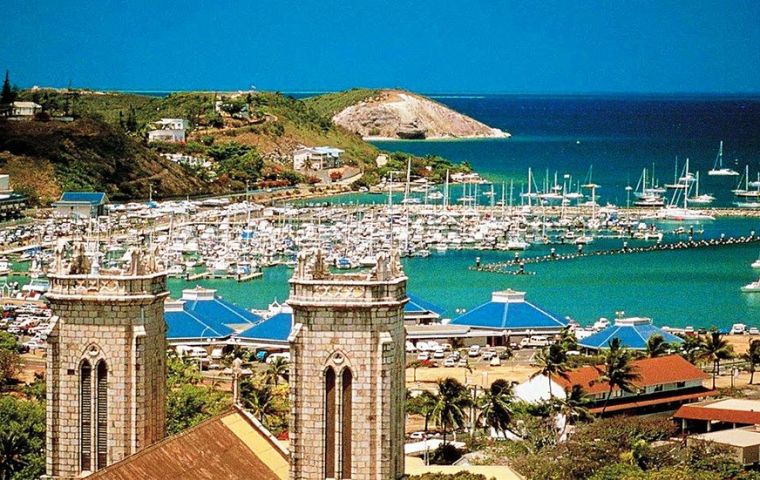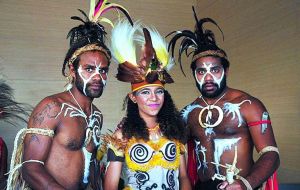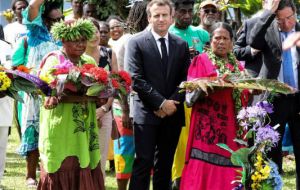MercoPress. South Atlantic News Agency
French Overseas Territory New Caledonia votes on independence referendum on Sunday
 Declared a French Overseas Territory in 1946, New Caledonia is one of 13 such overseas territories, scattered around the globe
Declared a French Overseas Territory in 1946, New Caledonia is one of 13 such overseas territories, scattered around the globe  New Caledonia is home to 269,000 people, 39% are indigenous Melanesians, known locally as Kanaks, while 27% are Caldoches, descendants of French settlers
New Caledonia is home to 269,000 people, 39% are indigenous Melanesians, known locally as Kanaks, while 27% are Caldoches, descendants of French settlers  A local assembly based in the capital, Nouméa administers its own affairs, but Paris still controls the islands’ defence, foreign affairs and higher education policy
A local assembly based in the capital, Nouméa administers its own affairs, but Paris still controls the islands’ defence, foreign affairs and higher education policy New Caledonia, an idyllic French Overseas Territory island territory in the southwestern Pacific, votes Sunday on whether to seek full independence from Paris, 18,000 km away Thirty years in the making, Sunday’s referendum will call 174,154 voters to the polls to test the appeal of remaining a part of France, a vector of state subsidies but also, some feel, a kind of neglect.
France took possession of the tropical archipelago in 1853, and the Pacific territory –like Australia, located 2,000 km to the west – began its colonial period as a penal colony. Declared a French Overseas Territory in 1946, New Caledonia is one of 13 such overseas territories -- the so-called “confetti of the French empire” – scattered around the globe. Nickel-rich, New Caledonia is home to 269,000 people, 39% of whom are indigenous Melanesians, known locally as Kanaks, while 27% are Caldoches, descendants of French settlers, alongside a smattering of other minorities from Polynesia, Indonesia and Vietnam.
In the 1980s, longstanding resentments between Kanaks and Caldoches, not least over indigenous land seizures by colonists, boiled over into deadly violence that claimed more than 70 lives. In 1988, between the two rounds of the French presidential election, a violent attack and a two-week-long hostage-taking by Kanak separatists on Ouvéa Island left four gendarmes, two soldiers and 19 separatist militants dead.
The French-brokered reconciliation that followed sought to rebalance wealth and political power. Subsequent accords gave New Caledonia its own special status that has allowed for gradually increasing autonomy. A local assembly based in the capital, Nouméa today administers its own affairs in many areas, although Paris still controls the islands’ defence, foreign affairs and higher education policy. For some, New Caledonia’s relative autonomy today is reason not to fear an independent future. For others though, that autonomy dilutes the need to make a clean break from France.
Economic interests lie at the heart of the debate. Opponents of independence argue that New Caledonia, aided by French subsidies, has a higher standard of living than say, neighboring Vanuatu. Kanaks supporting independence though complain of endemic discrimination and the high price of goods and real estate, which are pushed up by the high wage levels of French civil servants.
The lead-up to the high-stakes referendum, observers note, has been relatively peaceful, considering the fraught, decades-long lead-up to Sunday’s vote. “We really sense a certain serenity in the end, as if the referendum wasn’t going to be all that important, when it is after all punctuating a 30-year process of peace and decolonization,” the Université de Nouvelle-Calédonie’s Pierre-Christophe Pantz told French media on Thursday. “But it is precisely because of that, of those 30 years, that people can’t see anything other than peace and can’t imagine that anything else could happen.”
Few expect New Caledonia to vote in favour of independence from France on Sunday, with polls suggesting that as many as 69% of voters could turn down the prospect of parting ways. The 1998 Nouméa Accord requires France to allow an independence referendum by November 2018; it also provided for two further referenda to be held before 2022 in the event of a “no” result after this first vote.




Top Comments
Disclaimer & comment rulesCommenting for this story is now closed.
If you have a Facebook account, become a fan and comment on our Facebook Page!